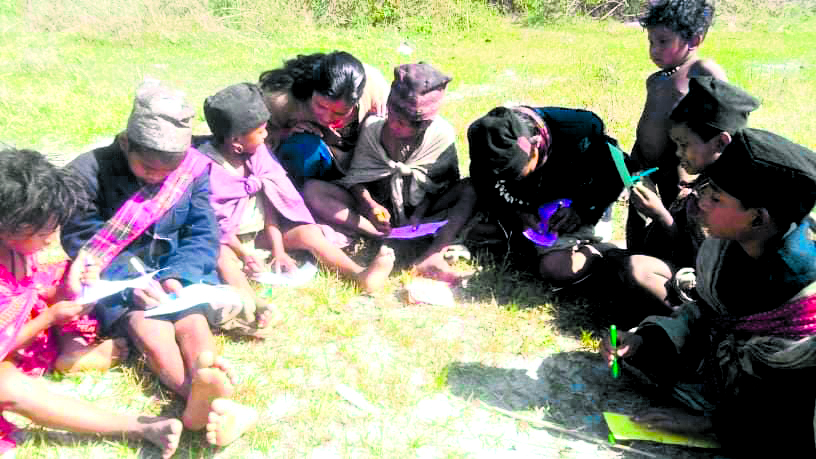Lalit Bahadur Budha, Surkhet
I witnessed a curious scene a couple of weeks ago when I visited a Raute settlement in Ratekhola in the mid-western hilly district of Surkhet. Sitting on a river bank, Raute children were learning Nepali alphabets. Some were sitting in a circle and singing “Kapuri Ka”, a famous children’s rhyme. A few others were writing. They were also learning English alphabets.
Raute children are fearful that their Chief might see them if they study near their settlement, so they go a little farther away to the banks of the Bheri River. “If our Chief comes to know about this, he will get angry. He tells us not to study but we have gone against his command,” says Birkha Bahadur Shahi sitting with his friends on the river banks. Nobody in Birkha’s family is literate; in fact, they believe studying is sinful.
'There was a time when our Chief used to disapprove of us wearing slippers. But now we are wearing shoes. Times are changing. Soon we will also get to go to school'
Dish Bahadur ShahiA Raute adolescent
Raute children, until some time back, used to get scared when they saw strangers. They hesitated to speak to anyone from outside their community. But with time they are becoming more outgoing and gregarious. Besides socializing with people from outside their community, these children are also keen on studying.
Two teachers have been assigned by the Social Service Center, an NGO, to teach the Raute children. “We are learning Nepali and English alphabets. Soon we will start learning numbers,” says Birkha Bahadur. “Eventually, I want to become a doctor. Or maybe a driver.”
Durga Khatri, one of the two teachers, says there has been a noticeable change in the children’s behavior since they began their studies. “They are showing greater interest in learning and are also more careful about cleanliness,” she says.
Raute children tell visitors about their dream of going to school and getting a job
As Rautes are a nomadic tribe, Khatri says she follows the children wherever they go. “But we have to persuade the Rautes to settle in one place, which will help get their children to school. It might take time, but it is not impossible,” says Khatri.
Deepak Shahi, a Raute teenager who cannot go to school although he wants to, says, “Now we need to study; otherwise we will not get jobs.” He talks about his dream of becoming his group’s leader when he gets older and the changes he intends to introduce. “When I become Chief, I will ensure all children in my group go to school.”
Every day, the Raute settlement attracts a number of visitors. While some go there just to take photos, others visit to learn more about the nomadic group. Children in the settlement tell them about their dreams of going to school and getting a job one day. People are awestruck when they hear this.
“Now it is hard to find game in the forest. And felling trees is strictly forbidden. So it is important that we study,” says Dish Bahadur Shahi, another teenager from the settlement. “I want to go to school and join the police force when I grow up. There was a time when our Chief used to disapprove of us wearing slippers. But now we are wearing shoes. Times are changing. Soon we will also get to go to school.”











